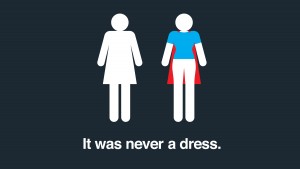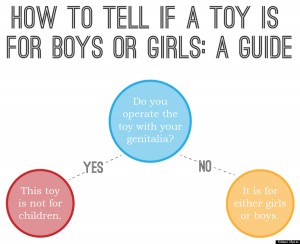by Lesley S. Curtis
I’m a native North Carolinian who sits down to pee. And I use restrooms that are labeled for men. I’ve done this since I can remember—only when there’s a stall, I’ve never walked in on anyone with their pants down—but I’ve also never thought anything about it. Anytime I had a choice and the women’s restroom was full or being cleaned or out of order, I used the one that wasn’t. I never felt in danger. I never felt like it was anyone’s business, frankly. It was about a biological necessity—a very personal one that now you know all about even though it’s absolutely none of your business.
And that’s what I’d like to write about here—how something that isn’t political became so. The new law that the legislature of my home state passed is based on some very old thinking about gender, sex, and sexuality that was never true in the first place. It deserves close examination because the way that it justifies discrimination is not only wrong; it’s illogical. It’s a kind of thinking that confuses several things in order to keep power in the hands of the few and, as always, it’s also about money. It is not just about the rights of a small percentage of the population. It’s about all of us and it needs to be challenged seriously.
Let’s examine the law’s motivation more closely. According to this law, women and girls, defined solely as people born with a female reproductive system, are in danger and need of protection while completing a normal and frequent biological process that requires them to be in “various states of undress.” This implies that for the few moments while a person’s pants are pulled down, an aggressor is more likely to attack or harass her. The notion is ludicrous. Most public restrooms labeled for women have stalls and doors with locks on them. There is no statistical evidence that the act of pulling one’s pants down to urinate in a public restroom elevates the risk of unwanted sexual contact. If an aggressor did indeed wish to prey upon someone at the exact moment that she were urinating, no law would be able to prevent that person from breaking down a door or crawling underneath a stall. As it stands, we all commonly expose our genitalia in the vicinity of strangers daily. There is no evidence that someone who also has a female reproductive system could not also initiate unwanted sexual contact. People with female reproductive systems, in other words, are not automatically protected from the threat of harm by peeing solely near other people with female reproductive systems. It is already illegal to harass or attack someone sexually. If this were really a risk for public restroom users, we would be discussing safety standards, such as better locks or stalls that go down to the floor.
We are, however, not discussing safety standards because that is not what this law is actually about. The law reflects a bizarre confusion between urination and sex acts. In men’s rooms, peeing and sex acts are supposed to be clearly delineated. The opposite, however, is true: men’s restrooms, not women’s, allow for this confusion. People born with male reproductive systems are raised to accept the fact that they expose their penises in public frequently. Can we take a minute to think about how odd that is? Why is it that women’s restrooms have lounges for sitting, chatting, and putting on make-up and men’s restrooms have troughs for communal urine? This has everything to do with the way that we define gender. It’s a cultural norm, which means that it’s socially constructed. It depends upon our definitions of the way things work which, thankfully, change according to time and context.
In men’s restrooms, the rules that dictate behavior demonstrate how rigidly masculinity is defined. I’m told (as I was not raised male) that no one looks. Anyone who does look, as the ABC sitcom Blackish tells us, is egregiously countering accepted cultural norms. Why is it okay for men to be forced to expose themselves in public? It suggests that having a penis makes one less vulnerable. Perhaps this norm even provides a secretly desired space for men to really find out who deserves to be president. It suggests that “real” men don’t care to look at other men’s penises and that “real” men don’t care about propriety—neither of which is the case.
That we accept this inequality in bathrooms segregated according to reproductive systems explains how normalized certain ideas about gender really are. Exposing one’s genitalia is only a risk for women, according to this law—and according to the way that we have traditionally set up bathrooms, too. Both of these assumptions are troubling. Would exposing one’s vagina necessarily be a risky behavior if we didn’t define the people who have vaginas as at risk? Is exposing one’s penis necessarily less risky if only people who were born with penises do so? Think about it: it’s circular logic. This law “protects” people according to outmoded and false definitions of gender that categorize men as sexual aggressors (only toward women) and women as victims without sexual desire (for each other or for the men, their potential aggressors). And, because this outmoded and illogical way of thinking has no way to account for people who go against this rigid binary, contradicting these ridiculous categorizations in an obvious way (we all do so in subtle ways as the restrictions do not correspond to individual behavior) is considered a sign of potential to do harm. It is not. Let me state that clearly: the way that one urinates has no bearing upon a person’s ability to commit or avoid criminal behavior.
And that brings me to the victims of this law because, let’s face it, I, a cis-woman, am probably not going to be arrested for rushing into the men’s room in a moment of need. What this law gets wrong is that it defines people whose gender identity does not correspond to those we conventionally associate with penises and vaginas as criminals in need of a law to regulate them back into the traditional binary structures that have kept a small number of white people with penises in power for too long. In other words, the thinking that structures the argument in support of this law suggests such ludicrous things as: having a penis necessarily makes you sexually desirous of people who have vaginas, or having a vagina makes you a victim. We could go so far as to say this thinking supports such ideas as: having a penis makes you love football. Having a vagina makes you want to powder your nose with another person who has a vagina. Having a penis makes you unable to care for children. Having a vagina makes you unable to harass someone sexually. Think about these statements. They are absurd.
But we desperately want them to be true. In general, we have very strict ideas about what it means to be a girl, a boy, a man, a woman. We encourage conforming to these ideas from very early on; having segregated bathrooms is an indicator. We expect certain behaviors and norms from our children based on their reproductive systems and then when our children respond to our expectations, we call this inevitable. We call it natural. It is not. Girls can wear blue and boys can like pink. Boys can like dolls and girls can like trucks. Boys can like dresses and girls can be aggressive. No law will make these things untrue. And this leads us to perhaps one of the most troubling aspects of the law—children in public schools are required to use restrooms labeled for boys or girls according to the type of reproductive system that they had at birth. This rule is not only about types of bodies, but about telling people what it means to have a certain kind of body. This requires teaching children from very early ages that boys do things that girls don’t, girls do things that boys don’t, and that deviation from this binary is a problem. Children learn what we teach them. Do we really want a new generation of people who believe that their reproductive systems leave them no choice?
As a person who sits down to pee and who was raised as a female in North Carolina by people from North Carolina whose parents were from North Carolina whose parents were from North Carolina, I know deeply that we, Tar Heels, can do better. We don’t have to be scared and we don’t have to invent potential risk in order to marginalize others. The absurd and discriminatory thinking that justifies this legislation is a threat to equality and progress for every one of us.
North Carolina has another extensive and strong history of discrimination, whose logic is as deeply flawed as this one and whose primary motivations are also driven by a desire to keep power in the hands of the few. A friend on Facebook posted this meme the other day, and bringing up the connection between gender, sexual, and racial discrimination is certainly merited.
When the NC state legislature met in a special session to pass this bill, they also included a provision that makes it illegal for cities to raise minimum wages above the state average. Though it might seem that Republicans were simply benefitting from this special session in order to promote another unrelated item of their political agenda, it would be erroneous not to recognize a clear connection. Discrimination is always about power. Establishing a false dichotomy between men and women, straight and gay, gender-conforming and non-gender-conforming allows us to believe in the fallacy of stark binary divisions. It supports an Us versus Them mentality.
 Take, for example, the two-sided Coca-Cola machine that sits in the Greensboro Civil Rights Museum. The side that sold drinks to the “colored” waiting room charged more for its product than the side that sold to the “whites,” even though people of African descent in North Carolina were less likely to have the money to pay extra for their drinks. That distinction established between people, very clearly, was about profit. This new bill follows a similar pattern.
Take, for example, the two-sided Coca-Cola machine that sits in the Greensboro Civil Rights Museum. The side that sold drinks to the “colored” waiting room charged more for its product than the side that sold to the “whites,” even though people of African descent in North Carolina were less likely to have the money to pay extra for their drinks. That distinction established between people, very clearly, was about profit. This new bill follows a similar pattern.
According to this legislation, businesses in rural areas of the state where the cost of living is lower could dictate what the minimum wage should be in places where the cost of living is higher. This law stands to benefit business owners who would save money on wages while it places undue hardship on people who pay more for housing, food, and other necessities. The Republicans who promoted and passed this bill profited from what was set up as a culture war between conservatives and progressives, between rural areas and cities, between south and north, between religious and non-religious, in order to keep more money in the hands of people who already have money, just like the Coke machine.
North Carolina, my beloved state, quit inventing stories. I have a child who will grow up to learn to be proud of where our family is from, not ashamed. My child will learn that people who defy an always-already false idea of gender normativity are not the problem. My child will figure out that made-up stories about division are really about power, not about the value of people. And when it comes time to pee on the potty, I’ll make sure that my child learns to lock the door without fear, no matter what label is written on it.
Lesley S. Curtis (@ProfLCurtis) is a native North Carolinian who holds a B.A. from the University of North Carolina at Chapel Hill and a Ph.D. from Duke University. She writes and researches in the histories of race and gender.




